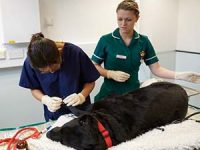Beep" is not a sound you expect to hear coming from a hummingbird feeder. Yet "beeps" abounded during a study led by the University of California, Davis to monitor hummingbirds around urban feeders and help answer questions about their behavior and health.
For the study, published today in the journal PLOS ONE, veterinary researchers tagged 230...


